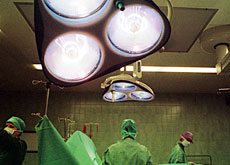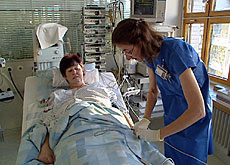
Medical errors blamed for up to 60 deaths a week

Medical experts want to lift the taboo on medical blunders said to be responsible for thousands of deaths in Switzerland every year.
The death of a heart transplant patient in Zurich last week has highlighted the need for more measures to prevent treatment errors, which are often not made public.
“There needs to be a complete rethink [about how we approach this issue],” said Daniel Scheidegger, head anaesthetist at Basel Cantonal Hospital and an expert in the field of medical errors.
Based on studies in the United States, the Federal Social Insurance Office estimates that mistakes could cause up to 3,000 deaths a year in Switzerland. Swiss hospitals treat at least 1.4 million medical cases a year.
On Tuesday the Swiss Foundation for Patient Safety released figures showing that between three and 16 per cent of hospital patients were the victims of “undesirable events”, up to half of which could be avoided.
Secrecy
The Swiss government set up a task force made up of Swiss and foreign experts in 2000 to look into the issue of medical errors. The group’s recommendations lead to the creation of the Foundation for Patient Safety three years later.
In a bid to destroy the culture of secrecy which surrounds medical blunders, Bern University Hospital launched a prize last year to encourage medical staff to report cases where patients had been placed at risk.
This was to ensure that measures could be put in place to prevent a repeat.
Scheidegger believes these are signs that the medical profession is moving in the right direction towards greater transparency.
“Even the fact that I – as someone from a rival hospital – was invited to a press conference by Zurich University Hospital about Voser’s death is encouraging.”
Zurich University Hospital on Tuesday admitted human error was to blame for the death of Rosmarie Voser, who was given a heart incompatible with her blood type.
Poor communication
Hospital director Christiane Roth blamed communication problems within the hospital’s organ transplant team – a verdict that comes as no surprise to Scheidegger.
“Around 85 per cent of medical errors are caused by poor communication. That’s inevitable in a sector where humans cannot be replaced by computers,” said the anaesthetist.
Scheidegger has been trying for over a decade to overcome this flaw. In 1992, together with the United States space agency, Nasa, his team created a full-scale, simulated operating theatre.
Two years later, they wrote a computer programme designed to register any error occurring in theatre, known as a critical incident reporting system (CIRS medical).
The system was adopted two years ago by Federation of Swiss Doctors and by the Association of Swiss Nurses. But the software is currently used by only a handful of doctors.
Awareness
“Around 30 hospitals have installed it, including Zurich University Hospital. But having it installed doesn’t mean it’s being used,” noted Scheidegger.
The software, which is being used in Germany, has also been installed at Basel Cantonal Hospital, where around five treatment errors are reported every week.
“I’d worry if the number went down to two cases a week,” he said, “because this software is meant to increase staff awareness and therefore the number of reported cases.”
Scheidegger is also dismayed that more doctors are not taught to cope better under pressure.
“Most doctors have spent years having to prove themselves when they were training, and find it hard to let their weaknesses show later on.”
swissinfo, Ariane Gigon Bormann
Around 2,000-3,000 fatal treatment errors occur in Switzerland every year, according to the Federal Social Security Office.
Up to 16% of patients are the victims of medical errors, says the Foundation for Patient Safety.
Around 30 Swiss hospitals are equipped with new computer software designed to register mistakes.
Victims of treatment errors in Switzerland must overcome a series of hurdles before they can claim compensation.
Patient groups put forward the idea of creating a national compensation fund in 2002, but so far no funding has been found.

In compliance with the JTI standards
More: SWI swissinfo.ch certified by the Journalism Trust Initiative








































You can find an overview of ongoing debates with our journalists here . Please join us!
If you want to start a conversation about a topic raised in this article or want to report factual errors, email us at english@swissinfo.ch.